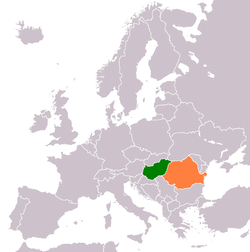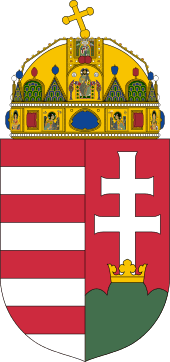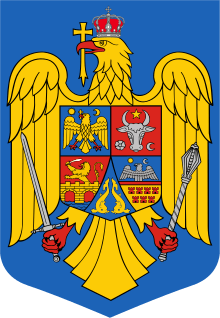Hungary–Romania relations
 |
|
Hungary |
Romania |
|---|---|
Hungarian-Romanian relations are foreign relations between Hungary and Romania. Relations between the two states date back from the Middle Ages. Both countries established diplomatic relations in 1920.
Their relationship is considered as "cold behind the warm" due to historical issues between two countries.
Bilateral relations
Hungary has an embassy in Bucharest, two general consulates (in Cluj-Napoca and Miercurea Ciuc) and four honorary consulates (in Constanța, Iași, Drobeta-Turnu Severin and Timișoara).[1] Romania has an embassy in Budapest and two general consulates (in Gyula and Szeged). The two countries share 443 km of common border. Both are full members of NATO and of the European Union.
Romania has developed strong relations with Hungary, with the latter playing a key role in supporting Romania's bid to join the EU. Romania's ethnic Hungarian party also participated in all the government coalitions between 1996 and 2008 and from 2009. In 1996, Romania signed and ratified a basic bilateral treaty with Hungary that settled outstanding disagreements, laying the foundation for closer, more cooperative relations.
Business
In 2012, the total amount of international trade between Romania and Hungary was 7.3 billion euro, of which exports from Romania were 2.4 billion euro, whereas exports from Hungary were 4.9 billion euro.[2] Hungary ranks as the third of Romania's trade partners, after Germany and Italy.[3]
MOL Group and OTP Bank, two of Hungary's largest companies,[4] are present in Romania since 2003 and 2004 respectively.[5][6] MOL Group operates (as of August 2013) a network of 138 fuel stations in Romania, which accounts for approximately 10 percent of the total network. OTP Bank has a widespread network of branches in Romania, with presence in every county.[7]
Wizz Air is a low-cost airline from Hungary, which operates flights from several airports in Romania (Bucharest, Cluj-Napoca, Târgu Mureș, Sibiu, Timișoara and Craiova) to various destinations in Europe.[8] It is the largest low-cost airline operating in Romania,[9] and in 2013 it carried 3.2 million passengers on its over 72 local routes.[10]
RCS & RDS, Romania's leading company in internet and cable and satellite television services, is arguably the second or third company on the television market in Hungary, with (as of August 2013) around 22.4 percent of market share.[11]
Sports
In ice hockey, teams from the two countries, as well as from Slovakia, compete in the MOL Liga. The competition was established in 2008 and comprises four teams from Hungary, two from Romania and one from Slovakia.[12]
In women's handball, CSM București and Gyori ETO met in the 2016 Champions League Final, making it the first time two teams from this countries meet in an EHF Champions League final. CSM won their first title after they beat Gyor 29–26, with 25–25 after extra-time and 4–1 at penalties.
Conflict
Despite having a relationship, many Hungarians believe that Romania did not deserve the current territory, because Transylvania was part and parcel of the Hungarian Kingdom, or an independent Hungarian Principality for ca. 1000 years, until the Treaty of Trianon.
World War I
During the war Hungary was a part of Austria-Hungary. In 1916 the Kingdom of Romania invaded Austria-Hungary, it was however beaten back and defeated within two weeks of the conflict.
Hungarian-Romanian War
During 1918-19 Hungarian–Romanian War, Hungary, led by Communist forces, tried to secure its borders from further infiltration, which led the two countries to war. Hungary was soon defeated,as it was engaged on multiple frontlines, and later occupied by Romanian forces for a few months time.
World War II
In World War II, Hungary and Romania were allied against the Soviet Union. But after the coup on 23 August 1944 Romania fought against Hungary. Soviet and Romanian troops invaded Hungary, thereby removing the fascists from power. After the war, Romania gained back Transylvania.
Football incidents
In 1982 World Cup qualifying, Romania lost 0–1 in Budapest and failed to gain a win by just a goalless draw. From then, Romania and Hungary, once again, faced the same group in the 2002 WC qualifying, this time Romania won both home and away 2–0. However, conflicts between Romanian and Hungarian fans only grew when Romania faced Hungary in 2014 World Cup qualifying, in which Romania eventually drew 2-2 in Budapest before defeating Hungary 3-0 at home. In the match held at Ferenc Puskas Stadium, FIFA had banned fans from visiting the stadium to avoid conflict.
In UEFA Euro 2016 qualifying, both teams were once more drawn to the same group.On 11 October 2014 Hungary and Romania drew 1-1 during a playoff in Bucharest. In the second round, both teams drew 0-0 at Groupama Arena on 4 September 2015. Due to minor incidents provoked by Ultras during the game, such as Romanian fans fighting each other, UEFA has imposed sanctions on both teams resulting in a fine and a visitor ban to their next match respectively.
See also
- Foreign relations of Hungary
- Foreign relations of Romania
- Hungarians in Romania
- Hungary-Romania football rivalry
References
- ↑ http://www.mae.ro/bilateral-relations/1748
- ↑ http://www.business24.ro/macroeconomie/exporturi/exporturile-romaniei-catre-ungaria-s-au-dublat-in-ultimii-patru-ani-dar-raman-la-jumatatea-importurilor-1532009
- ↑ http://www.dce.gov.ro/Comunicate/com_2013/26_nov_ung.htm
- ↑ http://www.zf.ro/business-international/top-500-companii-europene-in-functie-de-capitalizarea-bursiera-opt-sunt-poloneze-trei-din-cehia-si-doua-din-ungaria-niciuna-din-romania-11146281/
- ↑ http://www.zf.ro/companii/mol-a-alocat-12-mil-euro-pentru-integrarea-statiilor-shell-2891691/
- ↑ http://www.otpbank.ro/ro/despre-noi/otp-bank-romania/istoric/
- ↑ http://www.otpbank.ro/ro/despre-noi/retea-interna/lista-sucursale/sucursale/index.html
- ↑ https://wizzair.com/ro-RO/Country/RO
- ↑ http://www.wall-street.ro/tag/wizz-air.html
- ↑ http://www.zf.ro/companii/wizz-air-a-transportat-anul-trecut-3-2-mil-pasageri-din-si-spre-romania-in-crestere-cu-14-11862392
- ↑ http://www.wall-street.ro/articol/IT-C-Tehnologie/152401/cum-arata-piata-de-tv-din-ungaria-o-tara-in-care-noul-sef-al-liderului-in-domeniu-este-romanca-severina-pascu.html
- ↑ http://eurohockey.com/league/409-mol-liga.html
External links
- Hungarian embassy in Bucharest
- Hungarian general consulate in Miercurea-Ciuc
- Romanian Ministry of Foreign Affairs about relations with Hungary
- Romanian embassy in Budapest
- Romanian general consulate in Szeged (in Romamian only)
- Romanian general consulate in Gyula

